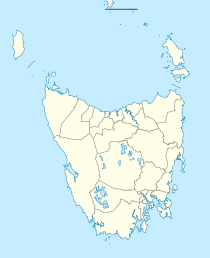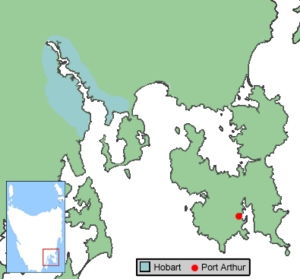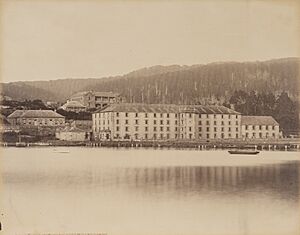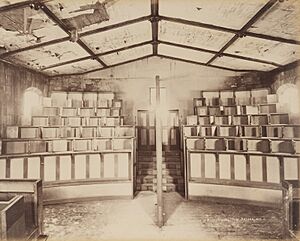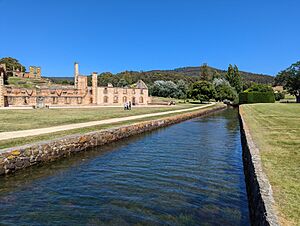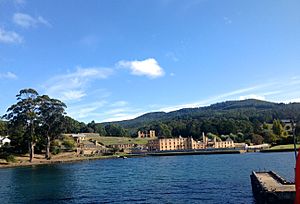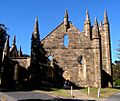Port Arthur, Tasmania facts for kids
| UNESCO World Heritage Site | |
|---|---|
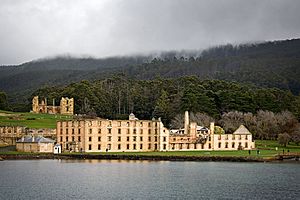
View of Port Arthur, Tasmania, one of the 11 penal sites constituting the Australian Convict Sites
|
|
| Part of | Australian Convict Sites |
| Criteria | Cultural: iv, vi |
| Inscription | 2011 (35th Session) |
| Area | 146 ha |
| Buffer zone | 1,216.51 ha |
| Port Arthur Tasmania |
|||||||||
|---|---|---|---|---|---|---|---|---|---|
| Population | 251 (2016 census) | ||||||||
| Established | 1830 | ||||||||
| Postcode(s) | 7182 | ||||||||
| Location |
|
||||||||
| LGA(s) | Tasman Council | ||||||||
| State electorate(s) | Lyons | ||||||||
| Federal Division(s) | Lyons | ||||||||
|
|||||||||
Port Arthur is a small town in Tasmania, Australia. It is located on the Tasman Peninsula, about 97 kilometers (60 miles) southeast of Hobart, the state capital.
Port Arthur is famous for being a former convict settlement. It is one of 11 places that make up the Australian Convict Sites. These sites are recognized as a World Heritage property by UNESCO. They show how the British Empire used to send convicts to Australia in the 18th and 19th centuries.
Sadly, in 1996, Port Arthur was also the site of a terrible event. It was the worst mass murder in Australia's recent history.
Contents
History of Port Arthur
Port Arthur was named after George Arthur. He was the lieutenant governor of Van Diemen's Land (which is now Tasmania). The area started as a place for cutting timber in 1830. But it soon became known as a harsh penal colony.
Port Arthur as a Penal Colony
From 1833 to 1877, Port Arthur was a prison for the most difficult convicts. These were people who had committed crimes again after arriving in Australia. Rebellious prisoners from other places were also sent here. Port Arthur had some of the strictest security in the British prison system.
How Prisoners Were Treated
Port Arthur's prison was an example of a "Separate Prison." This type of prison was designed to make prisoners think about their actions. The main prison building was finished in 1853 and expanded in 1855. It had a cross shape with exercise yards.
The prison focused on mental punishment instead of physical beatings. For example, food was used to reward good behavior. Prisoners could get more food or even treats like tea and sugar. If they misbehaved, they would only get bread and water.
The "Silent System" was also used. Prisoners wore hoods and had to stay silent. This was meant to make them reflect on their crimes. However, many prisoners developed mental health problems because of the lack of light and sound. An asylum was even built next to the prison for this reason.
What Prisoners Did
Port Arthur also held young convicts, some as young as nine years old. These boys were kept separate from the adult prisoners. They lived on Point Puer, which was the British Empire's second prison for boys.
Like the adults, the boys did hard labor. They cut stone and helped build structures. One building they helped construct was one of Australia's first churches that welcomed all Christian faiths. Attending Sunday service was required for all prisoners.
Archaeological digs at Port Arthur show what daily life was like. People prepared food and also did fun things like smoking and hunting. Workshops at the waterfront made shoes, metal items, and other goods. These workshops were run by convicts.
Researchers continue to study Port Arthur's history. They use things like web mapping and GIS to understand the lives of convicts. This helps us learn about their work and experiences.
Geography of Port Arthur
The Tasman Peninsula, where Port Arthur is located, was a very secure place. It was surrounded by water, which was even rumored to have sharks. The only way to the mainland was a narrow strip of land called Eaglehawk Neck. This area was heavily guarded with fences, soldiers, and dogs.
Whaling was not allowed nearby to stop convicts from escaping by boat. Sometimes, officers would hunt whales for sport. Smooth Island was likely used to grow fresh vegetables for the prison. Radcliffe Creek flows into Carnarvon Bay near Port Arthur.
Transport and Escape Attempts
Sailors visiting Port Arthur were not allowed to talk to prisoners. Ships had to give up their sails and oars when they landed. This was to prevent escapes. Still, many prisoners tried to escape, and some even succeeded. They would steal boats and travel long distances to freedom.
Port Arthur was also important for rail transport in Australia. In 1836, a tramway was built between Taranna and a jetty. Convicts were the only power source for this tramway. You can still see parts of it today at the Federation Chocolate Factory in Taranna.
Reputation and How People Saw It
Port Arthur was known as an inescapable prison, like Alcatraz Island later on. But some prisoners still tried to get away. A famous escapee was Martin Cash, who successfully fled with two others.
Even though Port Arthur was seen as a modern prison, it was still very harsh. Some people even thought its focus on mental punishment made it worse than other prisons. The Isle of the Dead was the burial place for all who died at the prison. Only 180 of the 1,646 graves belonged to staff and soldiers; the rest were unmarked convict graves. The prison closed in 1877.
Port Arthur as a Tourist Spot
Even before the prison closed in 1877, some people thought Port Arthur could be a tourist attraction. David Burn visited in 1842 and was amazed by its beauty. However, not everyone agreed. Anthony Trollope, in 1872, said no one would want to see the "strange ruins."
After the prison closed, much of the land was sold. By 1889, the area was becoming more popular, but the prison buildings were falling apart. Fires in 1895 and 1897 destroyed many old buildings. Earthquakes also caused damage.
A new town called Carnarvon grew in place of the prison. It was named after a British official. People in Carnarvon wanted to forget the dark past of Port Arthur. They encouraged boating, fishing, and shooting in the beautiful natural surroundings.
But the haunting stories of the prisoners and ghost tales made the ruins popular. Famous novels like For the Term of His Natural Life (1874) and The Broad Arrow (1859) also helped. These books were about convicts at Port Arthur.
By 1927, tourism had grown so much that the area's name was changed back to Port Arthur. In 1916, the Scenery Preservation Board took over managing the site. Later, in the 1970s, the National Parks and Wildlife Service managed it.
In 1979, money was given to preserve the site because of its history. The post office and other town offices moved to nearby Nubeena. Many old sandstone buildings, built by convicts, were cleaned and fixed. They now look much like they did in the 1800s. These include the "Model Prison," the Guard Tower, the Church, and parts of the main prison. The buildings are surrounded by green parkland. Visitors also go to the graves on the Isle of the Dead.
Point Puer, across the harbor, was the first boys' reformatory in the British Empire. Boys there learned basic education and trade skills.
Protecting the Historic Site
Since 1987, the Port Arthur Historic Site Management Authority has looked after the site. The Tasmanian government and visitor fees help pay for its upkeep. Volunteer groups also work at Point Puer to help researchers learn more about the boys' prison.
On July 31, 2010, UNESCO added Port Arthur Historic Site to the World Heritage Register. It is part of the Australian Convict Sites. Port Arthur is one of Australia's most visited historical places. Over 250,000 people visit it every year.
Tragic Event
On April 28, 1996, a very sad event happened at the Port Arthur historic site. Many people lost their lives or were injured in a mass shooting. This tragedy led to significant changes in Australia's gun laws. Today, the site serves as a memorial and a place for reflection.
Images for kids
-
A postcard showing a convict team ploughing a farm at Port Arthur, dated 1926
See also
 In Spanish: Port Arthur (Tasmania) para niños
In Spanish: Port Arthur (Tasmania) para niños


